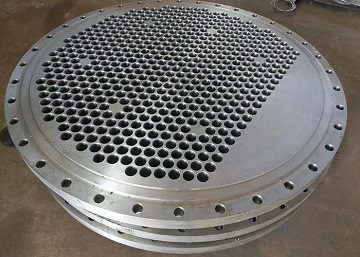Categories
- Pipe & Tube (18)
- Flange & Fitting (97)
- Fastener & Gasket (12)
- Valve & Pump (18)
- Base Material (11)
- Equipment (8)
- Application (31)
- Technical (110)
ASTM A266/ A266M is the standard specification for carbon steel forgings for pressure vessel components. It covers four grades of carbon steel forgings for boilers, pressure vessels, and associated equipment: Grade 1, Grade 2, Grade 3, and Grade 4. The UNS number designation for each grade is K03506 [Grade 1], K03506 [Grade 2], K05001 [Grade 3], and K03017 [Grade 4], respectively. The most commonly used forgings manufactured in accordance with ASTM A266 include tube sheets, hubbed flat heads, or nozzles, that are ordered for ASME Boiler and Pressure Vessel Code applications.

Heat exchanger tube sheets manufactured in accordance with ASTM A266.
The steel shall be made by a melting process and shall be subsequently forged as closed as practical to the specified shape and size of finished products. Surfaces of ASTM A266 forgings shall be machined as designated by the purchaser. Unmachined surfaces shall be sufficiently free of scale to permit inspection. Machining are generally performed after heat treatment. Welding repair is not permitted to ensure good quality.
| Item | Chemical Req. for ASTM A266, % | ||
| Gr. 1 & 2 | Gr. 3 | Gr. 4 | |
| C | ≤ 0.30 | ≤ 0.35 | ≤ 0.30 |
| Mn | 0.40~1.05 | 0.80~1.35 | 0.80~1.35 |
| P | ≤ 0.025 | ≤ 0.025 | ≤ 0.025 |
| S | ≤ 0.025 | ≤ 0.025 | ≤ 0.025 |
| Si | 0.15~0.35 | 0.15~0.35 | 0.15~0.35 |
After forging and before reheating for heat treatment, the forgings in accordance with ASTM A266 shall be cooled in such a manner as to prevent injury and to accomplish transformation. All the ASTM A266 forgings shall be heat treated by one of the four processes: annealing, normalizing, normalizing and tempering, or liquid quenching and tempering. When tempering is performed, it shall be at a subcritical temperature, but no less than 1100°F [595°C].
| Tensile Requirements | Gr. 1 | Gr. 2 & 4 | Gr. 3 |
|---|---|---|---|
| T.S min. ksi [Mpa] | 60~85 [415~585] | 70~95 [485~655] | 75~100 [515~690] |
| Y.S min. ksi [Mpa] | 30 [205] | 36 [250] | 37.5 [260] |
| EL. in 2" or [62.5 mm] min. % | 23 [21] | 20 [18] | 19 [17] |
| R.o.A min. % | 38 | 33 | 30 |
| ASTM A266 Grade | Brinell Hardness HBW |
|---|---|
| 1 | 121~170 |
| 2 | 137~197 |
| 3 | 156~207 |
| 4 | 137~197 |
A plurality of testing and inspection shall be performed on forgings conforming to ASTM A266. It includes heat analysis, tensile test, hardness test, hydrostatic test, magnetic particle examination, liquid penetration examination, macro-etch test, as well as Charpy impact tests.
The latest standard specification ASTM A266/ A266M – 2018 is presented in PDF format (this technical literature shall only be used for internal communication purpose).
